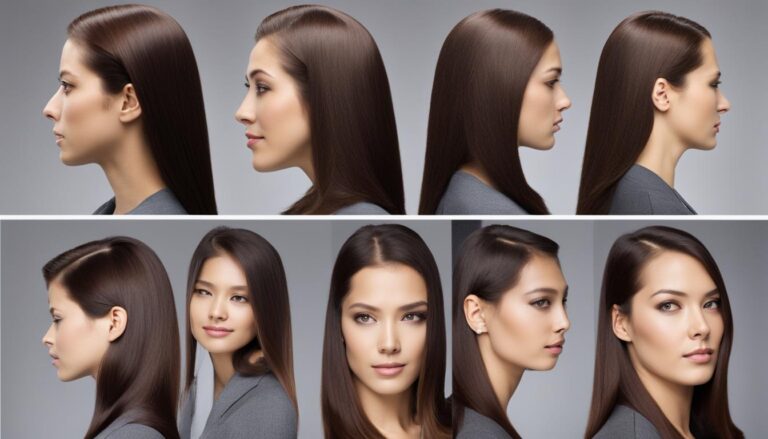How much will my hair grow in 3 weeks?
Are you curious about how much your hair can grow in just three weeks? The rate of hair growth can vary from person to person, but on average, hair can grow up to one-tenth of an inch or slightly more in a week. However, it’s important to note that there are several factors that can affect hair growth, such as genetics, hormones, nutrition, and stress levels.
During the average hair growth cycle, which lasts about 2 to 6 years for scalp hair, the hair grows at a rate of 0.3 to 0.4 mm per day. This means that in three weeks, your hair can potentially grow around half an inch or a little more.
Key Takeaways:
- The average rate of hair growth is 0.3 to 0.4 mm per day.
- Hair can grow up to one-tenth of an inch or slightly more in a week.
- Genetics, hormones, nutrition, and stress levels can affect hair growth.
- On average, an individual loses about 50 to 100 hairs every day and grows the same amount.
- Maintaining a healthy lifestyle and good scalp hygiene can promote optimal hair growth.
Factors Affecting Hair Growth
When it comes to achieving faster hair growth, there are several factors that can play a role in promoting natural hair growth. Genetics, hormones, and nutrition are significant contributors to the health and growth of our hair. To optimize your hair growth potential, here are some tips:
- Eat a balanced diet: Consuming a diet rich in protein, calcium, iron, and zinc, as well as vitamin B complex, can provide the necessary nutrients for healthy hair growth.
- Practice good scalp hygiene: Shampoo your hair two to three times a week, use special filters in the shower to combat hard water, and avoid hot water head baths. Additionally, conditioning your hair after washing can help maintain a healthy scalp and stimulate hair growth.
- Avoid damaging hairstyles and styling tools: Tight hairstyles, frequent use of curlers, hot irons, and chemicals can damage hair follicles, leading to hair loss and thinning. Opt for loose hairstyles that don’t pull on your hair and avoid excessive heat and chemical treatments.
By incorporating these fast hair growth tips into your routine, you can promote healthy hair growth and maintain the vitality of your locks.
Natural Remedies for Hair Growth
In addition to the above tips, there are some natural remedies that can help stimulate hair growth:
- Massaging oils onto the scalp: Oils such as argan, coconut, almond, and olive oil can be massaged onto the scalp to stimulate dormant hair follicles and promote hair growth.
- Homemade hair masks: Creating hair masks using ingredients like egg yolk, olive oil, and honey can help nourish and moisturize the hair, leaving it soft, shiny, and promoting a healthy scalp.
These natural remedies can be used in conjunction with a healthy lifestyle and hair care routine to enhance hair growth and maintain optimal hair health.
Topical Treatments for Hair Growth
When it comes to stimulating hair growth, there are several topical treatments that can be effective. One popular option is minoxidil, also known as Rogaine. This over-the-counter treatment comes in liquid, foam, and shampoo forms, making it easy to incorporate into your haircare routine. By applying minoxidil to the scalp twice a day, you can stimulate hair growth and potentially regrow about 10% of the hair that has been lost.
Additionally, there are other over-the-counter products that can help hydrate the scalp and prevent hair loss. These products often contain ingredients such as ceramides, urea, and lactate, which can nourish and moisturize the scalp, promoting healthy hair growth.
If you prefer natural remedies, massaging oils onto the scalp can be beneficial. Oils like argan, coconut, almond, and olive oil can help stimulate dormant hair follicles and promote hair growth. You can also create homemade hair masks using ingredients like egg yolk, olive oil, and honey to nourish and revitalize the hair and scalp. These remedies can not only promote hair growth but also make the hair soft and shiny while relieving dry scalp.

Summary:
In conclusion, there are various topical treatments available that can help stimulate hair growth. Minoxidil (Rogaine) is a popular choice, and other over-the-counter products containing hydrating ingredients can also be effective. For those looking for natural remedies, massaging oils onto the scalp and using homemade hair masks can promote hair growth. It’s important to remember that everyone’s hair growth journey is unique, and it may take time to find the right treatment that works for you. Consulting with a healthcare provider or dermatologist can provide personalized recommendations and guidance for achieving optimal hair growth.
Understanding the Hair Growth Cycle
When it comes to hair growth, understanding the hair growth cycle is crucial. The hair growth cycle consists of three main stages: anagen, catagen, and telogen. Each stage plays a significant role in the overall growth and health of your hair.
Anagen Phase
The anagen phase is the active phase of hair growth. During this stage, cells in the hair follicles divide rapidly, and new hair shafts are formed. The length of the anagen phase varies for each individual and can last anywhere from 2 to 6 years for scalp hair. On average, the hair grows about half an inch per month during this phase.
Catagen Phase
The catagen phase is a transitional phase that follows the anagen phase. It lasts for about 2 weeks. During this phase, the hair follicles shrink and detach from the blood supply, causing the hair growth to slow down. A club hair forms during this stage, which is a fully formed hair that is no longer growing.
Telogen Phase
The telogen phase is the resting phase of the hair growth cycle. Approximately 10-15% of our hair is in this phase at any given time. The telogen phase lasts for about 100 days for scalp hair. During this phase, the hair follicle is not actively producing new hair. Instead, it rests before eventually shedding. It’s normal to shed between 25 to 100 telogen hairs each day.
Understanding the hair growth cycle can help us better understand why hair growth varies from person to person. It’s important to note that each hair follicle goes through this cycle about 10 to 30 times in a lifetime. So, if you’re experiencing hair shedding, it’s likely a normal part of the hair growth cycle. However, if you have concerns about excessive hair loss or slow hair growth, it’s advisable to consult with a healthcare professional or a dermatologist.
Factors that Affect Hair Growth
Several factors can influence the growth of hair and contribute to hair loss. Understanding these factors can help individuals take appropriate measures to promote healthy hair growth. Some common factors that affect hair growth include:
Hormonal Conditions
Hormonal imbalances can have a significant impact on hair growth. Conditions such as thyroid disorders, polycystic ovary syndrome (PCOS), and hormonal changes during pregnancy and menopause can contribute to hair loss. Hormones like dihydrotestosterone (DHT) can also cause hair follicles to shrink, leading to thinning hair.
Aging
As we age, our hair growth naturally slows down. The rate of hair growth decreases, and the hair follicles become smaller, producing thinner strands of hair. Additionally, aging can lead to graying of the hair as the pigment-producing cells in the hair follicles gradually decrease.
Other Factors
In addition to hormonal conditions and aging, other factors can affect hair growth. These include:
- Genetics: The genes we inherit from our parents can influence hair growth patterns and the likelihood of experiencing hair loss.
- Nutrition: A balanced diet that provides essential nutrients, such as vitamins, minerals, and proteins, is crucial for healthy hair growth.
- Mental and Physical Stress: High levels of stress can disrupt the hair growth cycle and lead to temporary hair loss.
- Hairstyling and Treatments: Frequent use of heat styling tools, hair dyes, and harsh chemical treatments can damage the hair and weaken the follicles, resulting in hair loss.
Understanding the factors that affect hair growth can help individuals make informed choices about their hair care routines and seek appropriate treatments if necessary. Maintaining a healthy lifestyle, managing stress levels, and consulting with a healthcare professional can all contribute to maintaining optimal hair health.

Remedies for hair growth and hair loss
When it comes to promoting hair growth or addressing hair loss, there are several remedies that can be explored. These remedies range from simple lifestyle changes to topical treatments and professional interventions. Here are some effective remedies to consider:
Lifestyle and Hair Care Adjustments:
- Ensure a balanced diet rich in protein, vitamins, and minerals to support healthy hair growth.
- Practice good scalp hygiene by keeping it clean and moisturized. Avoid excessive heat styling and tight hairstyles that can cause damage or tension to the hair follicles.
- Consider using a shampoo and conditioner specifically formulated to promote hair growth.
- Protect your hair from harsh environmental factors, such as excessive sun exposure or chlorine from swimming pools.
Topical Treatments:
- Minoxidil (Rogaine) is a popular over-the-counter treatment that can help stimulate hair growth. It is available in various forms, such as liquid, foam, or shampoo.
- Try massaging essential oils like argan, coconut, almond, or olive oil onto the scalp. These oils can help improve blood circulation and stimulate hair follicles.
- Consider using homemade hair masks with natural ingredients like egg yolk, olive oil, or honey. These masks can provide nourishment to the hair and scalp.
Professional Interventions:
- Microneedling and red light therapy are two professional interventions that can stimulate hair growth by promoting collagen production and improving blood circulation to the scalp.
- Platelet-rich plasma (PRP) injections involve extracting platelets from your blood and injecting them back into the scalp to promote hair growth.
- If natural remedies and treatments do not yield significant results, consulting with a healthcare provider or a dermatologist can provide further guidance. They may recommend prescription hair growth treatments or supplements.
It’s important to note that the effectiveness of these remedies may vary from person to person. Hair growth issues can sometimes indicate underlying medical conditions, so it’s always advisable to consult with a healthcare provider if experiencing significant changes in hair growth or hair loss.

Conclusion
In summary, the rate at which your hair grows in 3 weeks can vary depending on factors such as genetics, hormones, nutrition, and overall health. On average, hair can grow up to one-tenth of an inch or slightly more in a week, which means you can expect some noticeable growth over the course of three weeks. However, it’s important to remember that individual hair growth can differ.
If you’re looking to enhance your hair growth, there are several solutions you can consider. Maintaining a healthy lifestyle, including a balanced diet that is rich in protein, calcium, iron, zinc, and vitamin B complex, can promote optimal hair growth. Additionally, practicing good scalp hygiene, avoiding tight hairstyles and damaging hair tools, and using topical treatments like minoxidil or natural oils can stimulate hair growth and improve overall hair health.
If you’re experiencing significant changes in hair growth or hair loss, it’s always advisable to consult with a healthcare provider. They can provide further guidance and personalized solutions based on your specific needs and underlying medical conditions. Remember, everyone’s hair journey is unique, and finding the right approach for you may require some experimentation and professional advice.
Remember, hair growth is a gradual process, and patience is key. By taking care of your overall health and implementing hair growth solutions, you can support your hair’s natural growth cycle and potentially see positive results over time.
FAQ
How much will my hair grow in 3 weeks?
The average rate of hair growth is 0.3 to 0.4 mm per day, which means your hair can grow up to one-tenth of an inch or slightly more in a week. In 3 weeks, you can expect your hair to grow approximately 0.9 to 1.2 mm.
What are the factors that affect hair growth?
There are several factors that can influence hair growth, including genetics, hormones, nutrition, and overall health. These factors can determine the rate at which your hair grows and its overall health.
How can I promote hair growth naturally?
To promote natural hair growth, it’s important to maintain a healthy lifestyle. This includes eating a balanced diet rich in protein, calcium, iron, and zinc, as well as vitamin B complex. Practicing good scalp hygiene, avoiding tight hairstyles and damaging hair treatments, and using topical treatments like minoxidil can also help stimulate hair growth.
What are some topical treatments for hair growth?
One popular topical treatment for hair growth is minoxidil (Rogaine), which can help regrow about 10% of lost hair when applied to the scalp twice a day. Other options include using products containing ceramides, urea, and lactate to hydrate the scalp and prevent hair loss. Massaging oils like argan, coconut, almond, and olive oil onto the scalp can also stimulate hair growth.
What are the stages of the hair growth cycle?
The hair growth cycle consists of three main stages: anagen, catagen, and telogen. During the anagen phase, which lasts 2 to 6 years for scalp hair, the hair actively grows. The catagen phase is a transitional phase that lasts about 2 weeks, during which growth slows down and a club hair forms. The telogen phase is a resting phase that lasts about 100 days for scalp hair before shedding.
What factors can negatively affect hair growth?
Several factors can negatively affect hair growth, including health conditions such as alopecia areata, anemia, bacterial infections, autoimmune conditions, and certain infectious diseases. Hormonal imbalances, aging, and periods of significant stress or trauma can also impact hair growth.
What remedies are available for hair growth and hair loss?
Remedies for hair growth and hair loss include changing hair styling and care routines, using topical treatments like minoxidil, trying microneedling or red light therapy, considering platelet-rich plasma injections, and consulting healthcare providers for potential prescription treatments or supplements.
Can I expect significant hair growth in a short period of time?
Hair growth is a gradual process, and significant growth in a short period of time is unlikely. It’s important to have realistic expectations and understand that individual hair growth rates can vary. However, by following a healthy lifestyle and using appropriate treatments, you can promote optimal hair growth.







